Charles E W Bean, Diaries, AWM38 3DRL 606/17/1 - September - October 1915 - Part 4
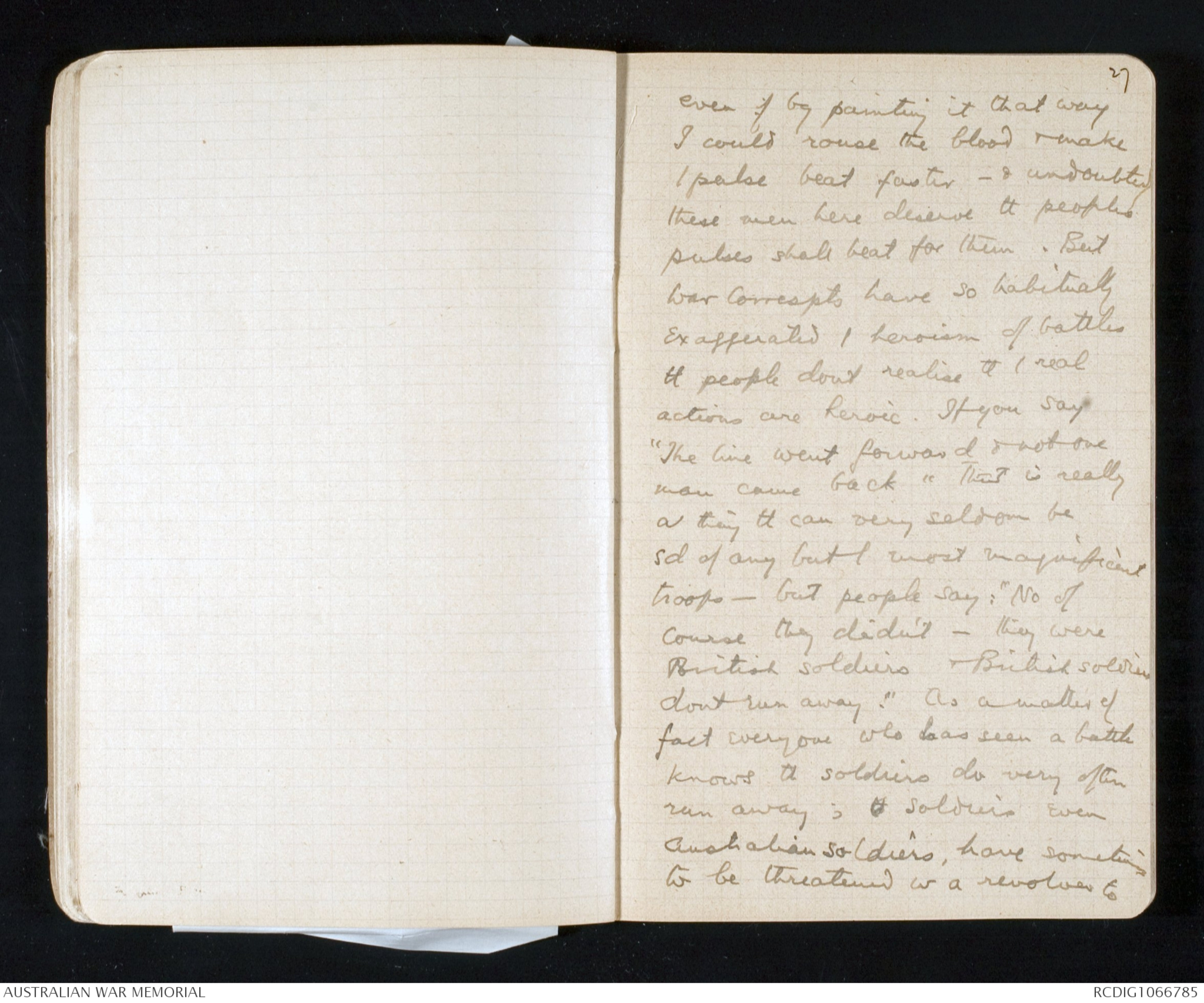
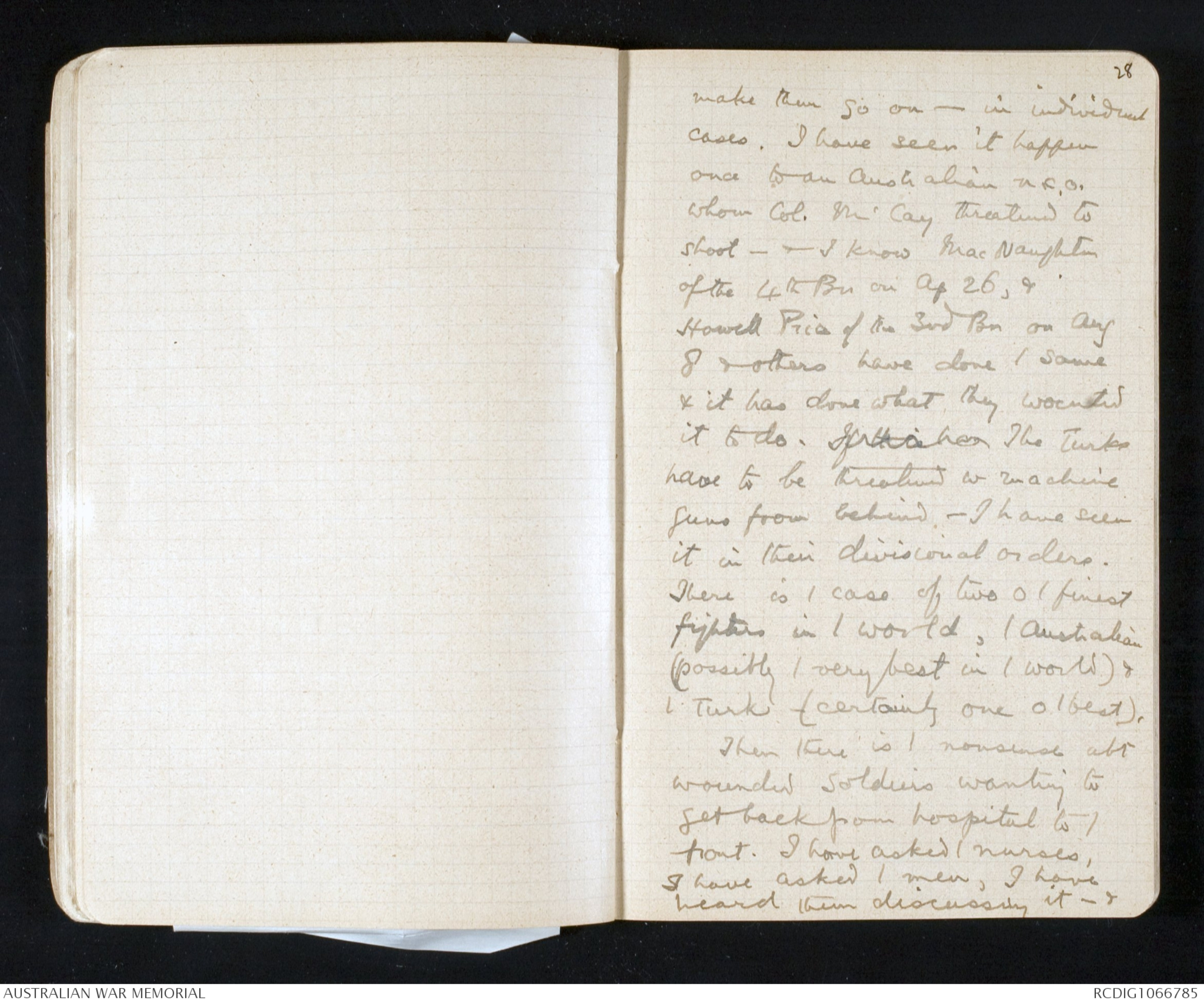
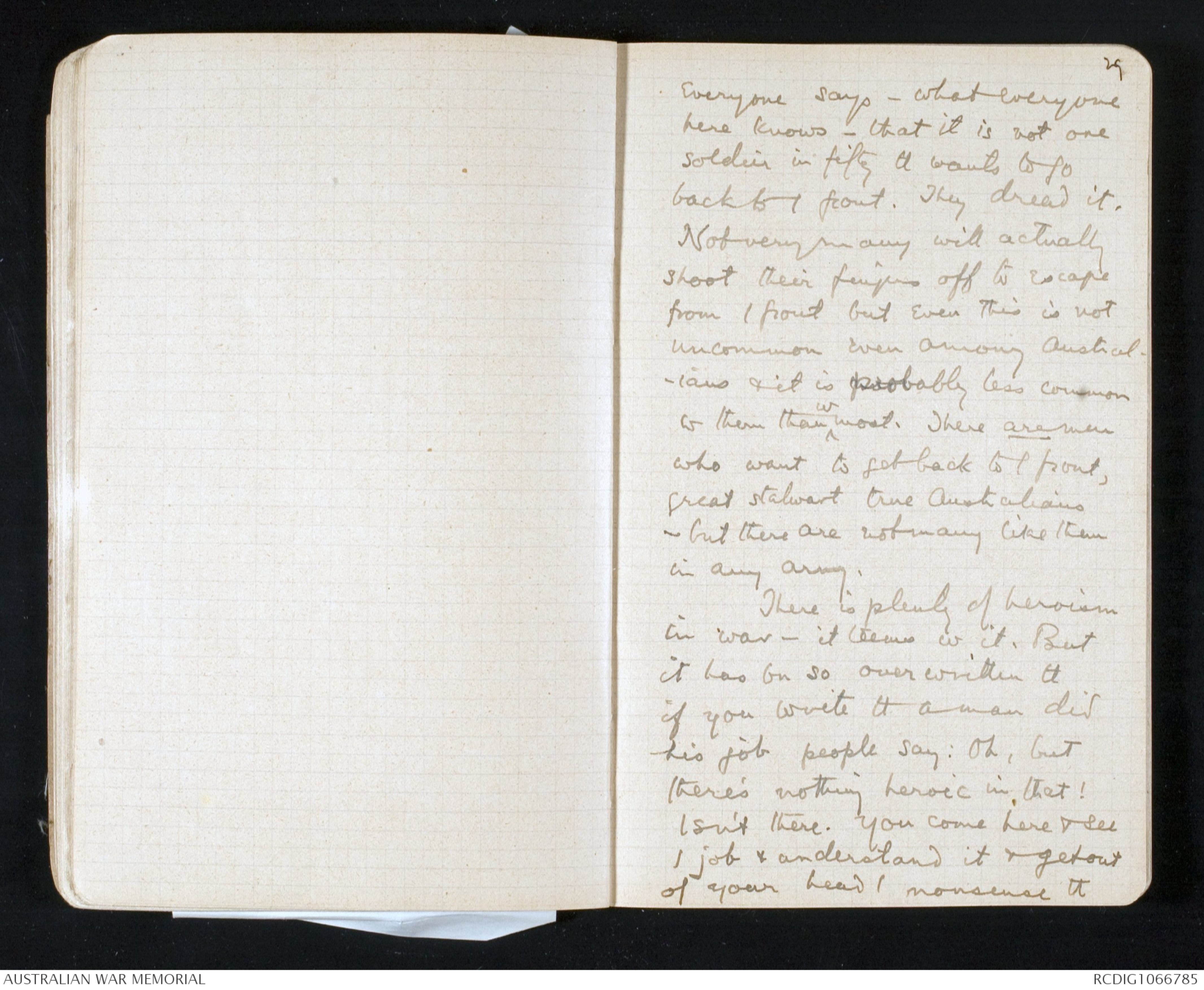
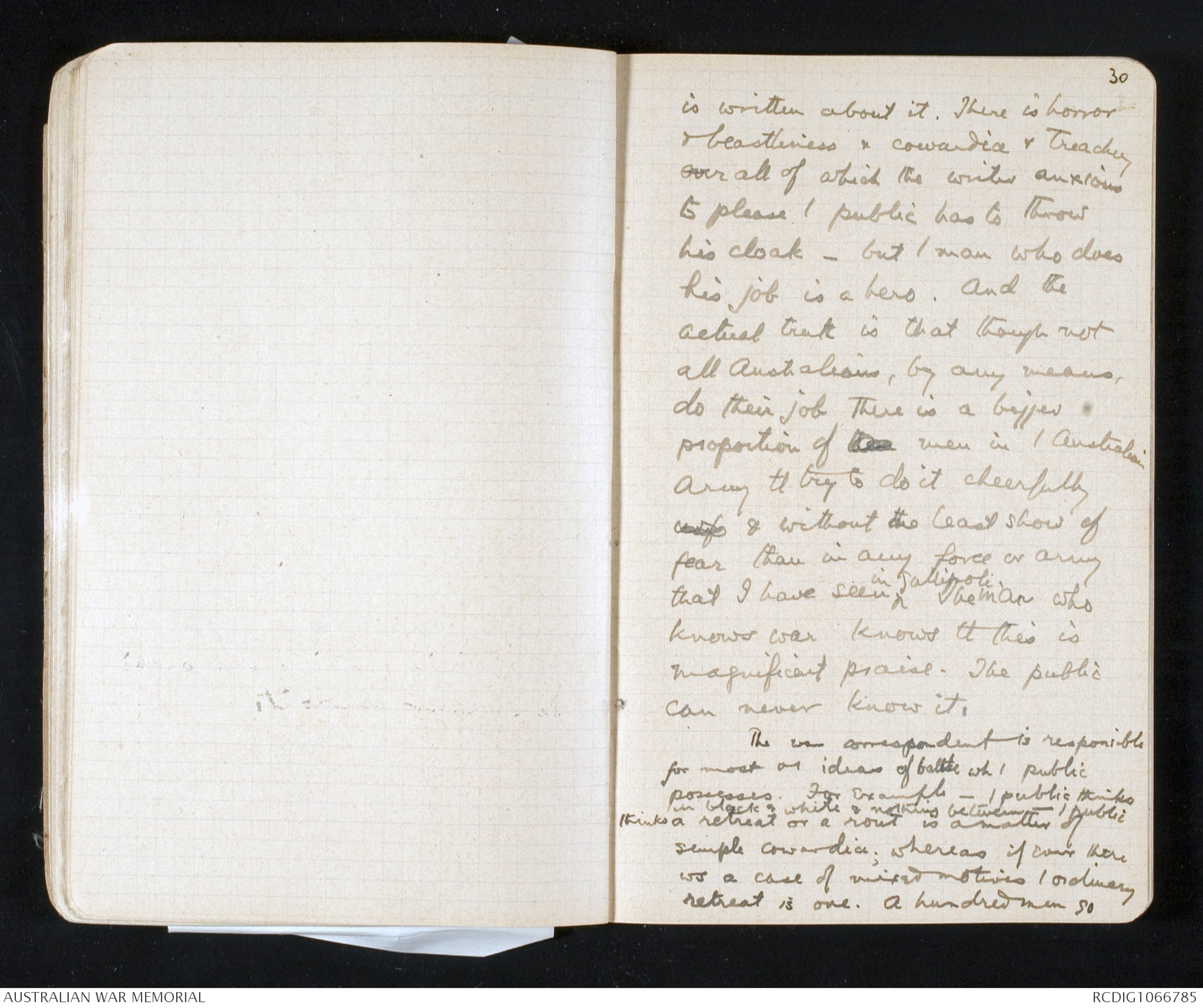
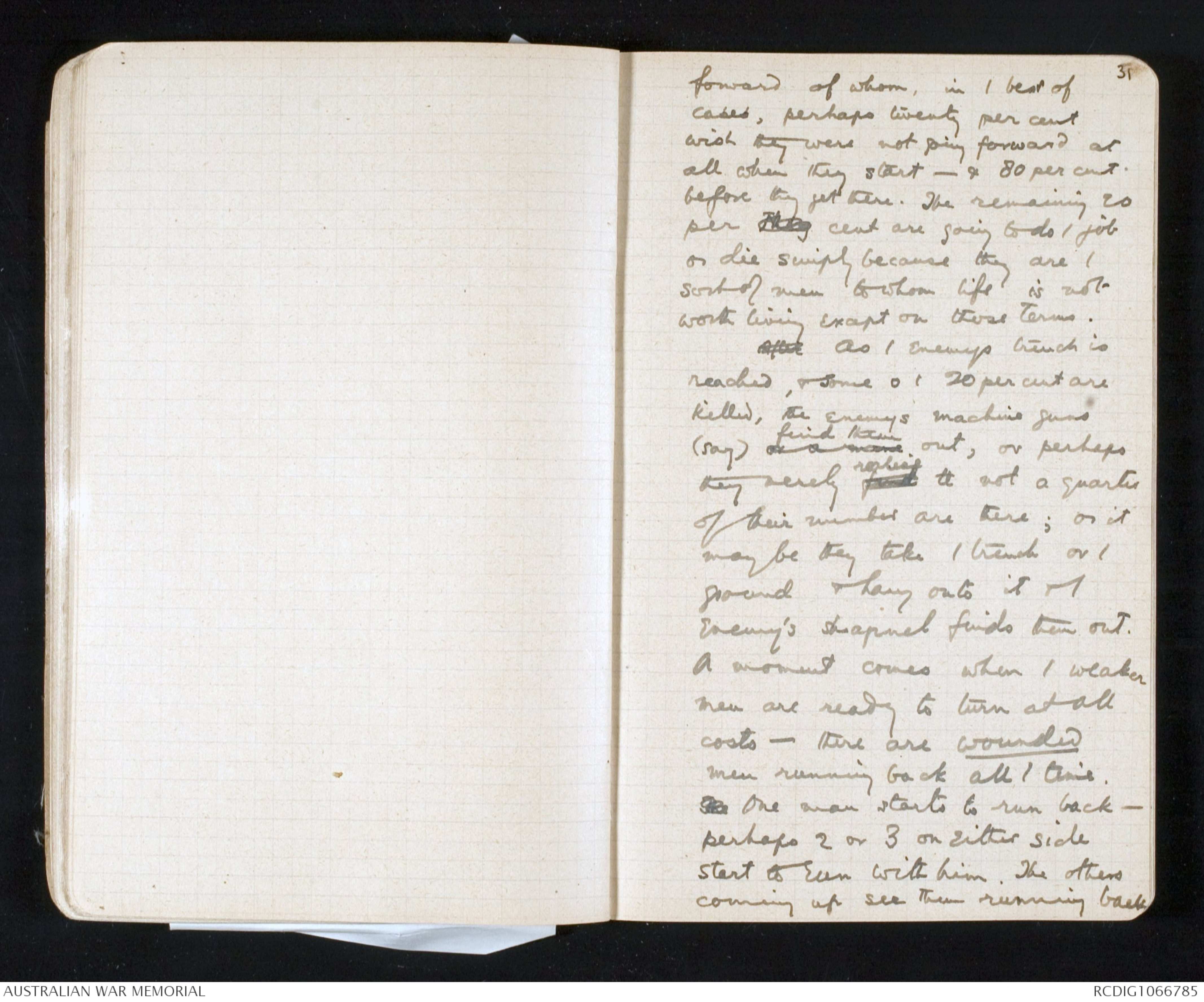
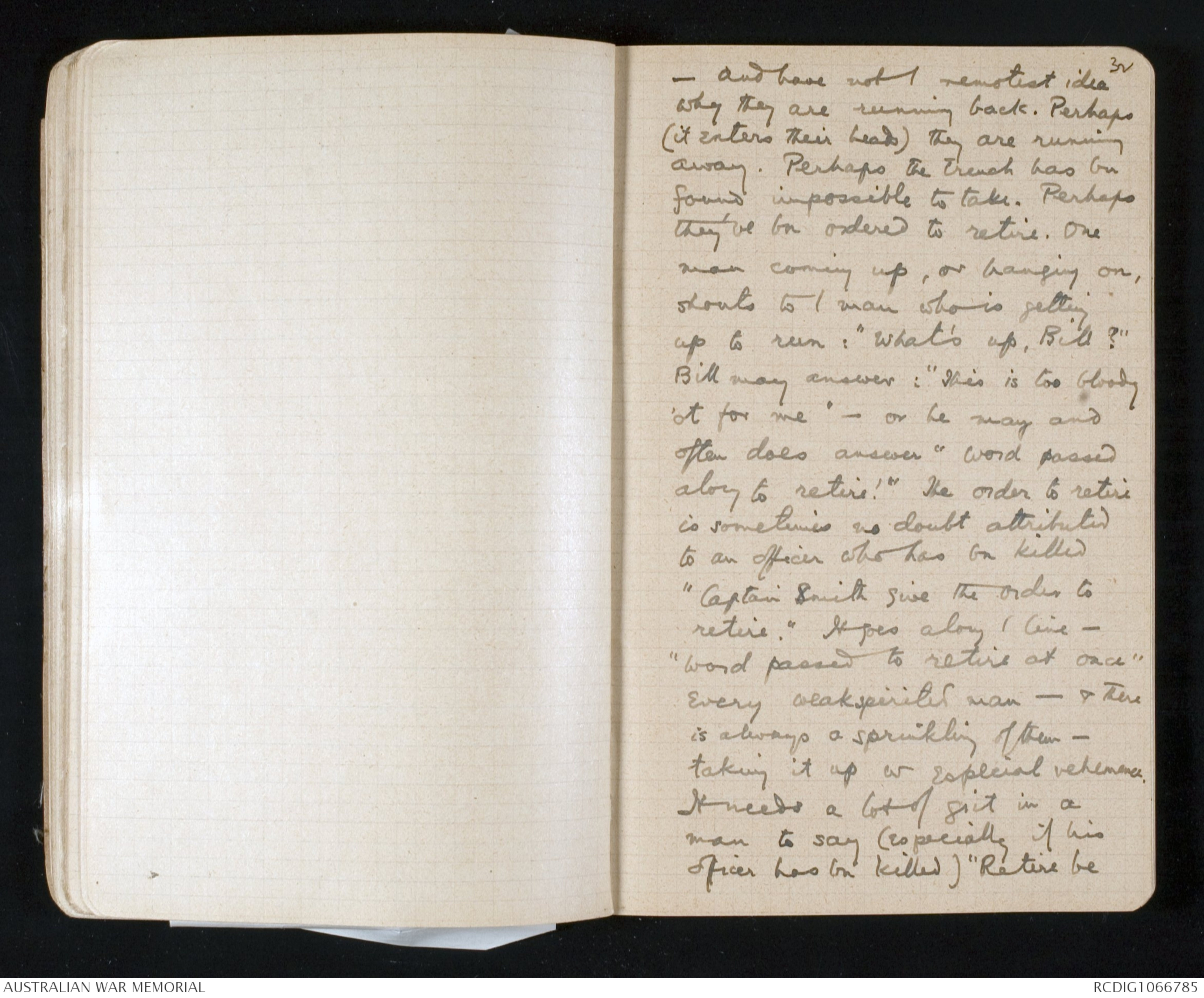
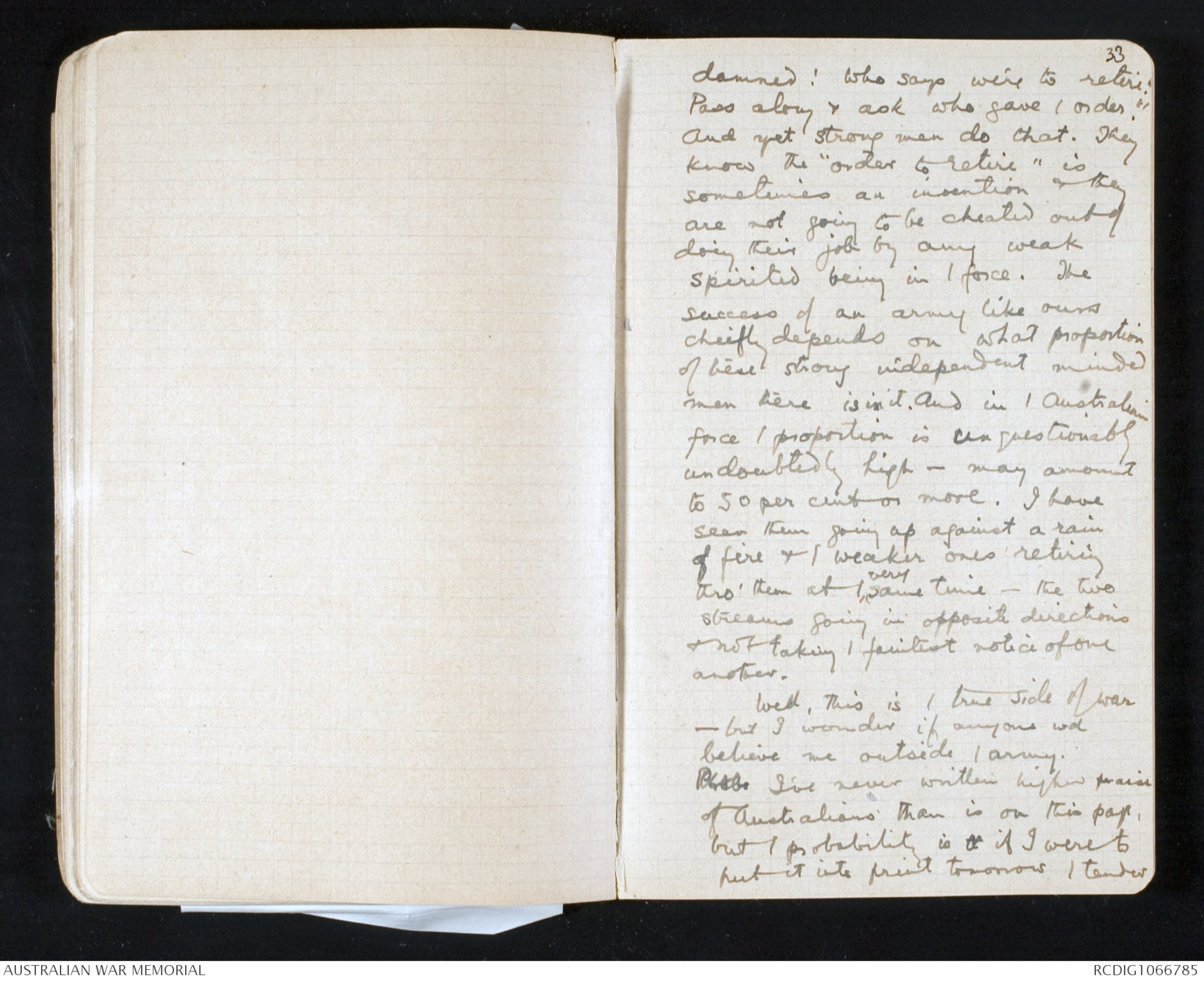
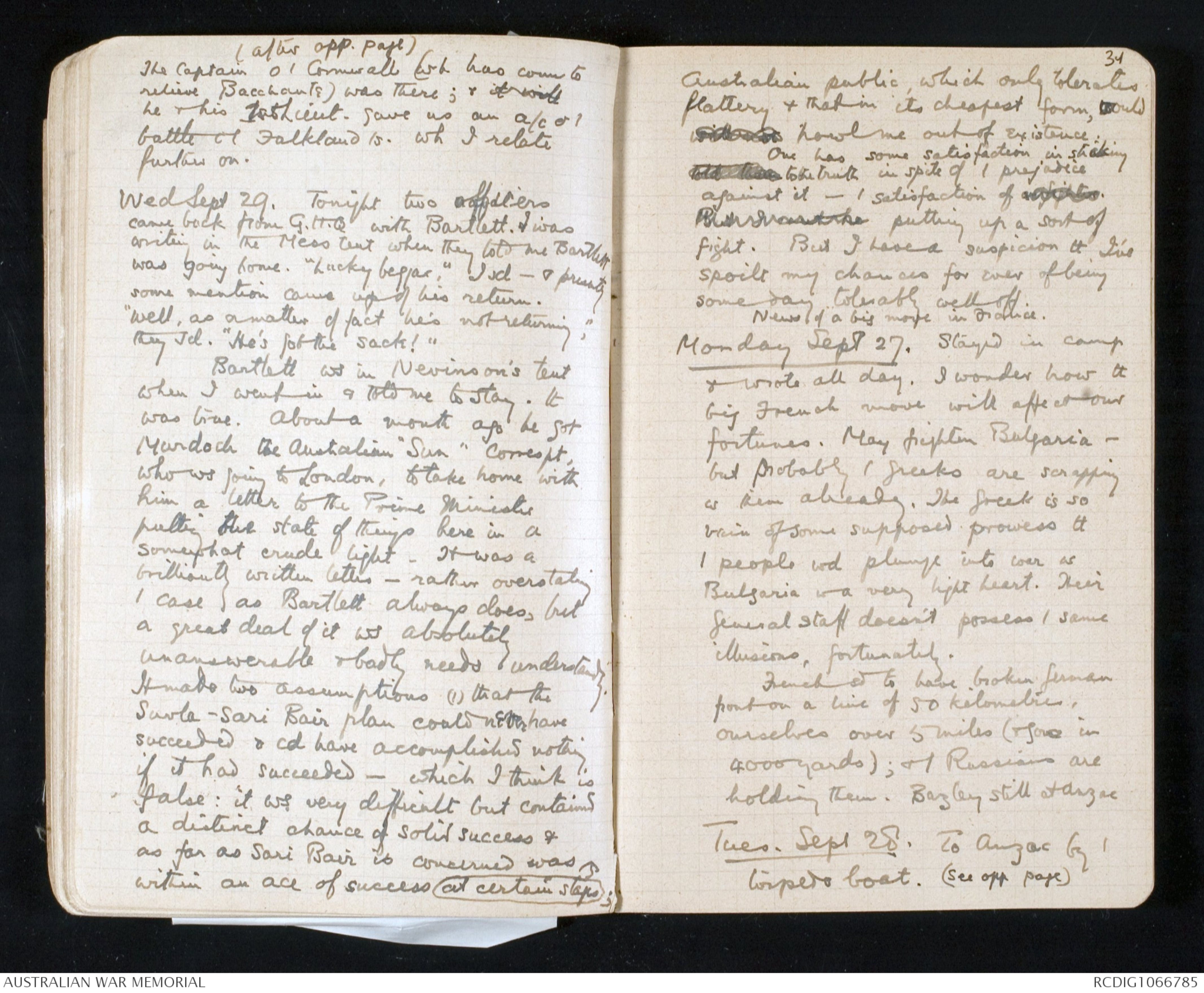
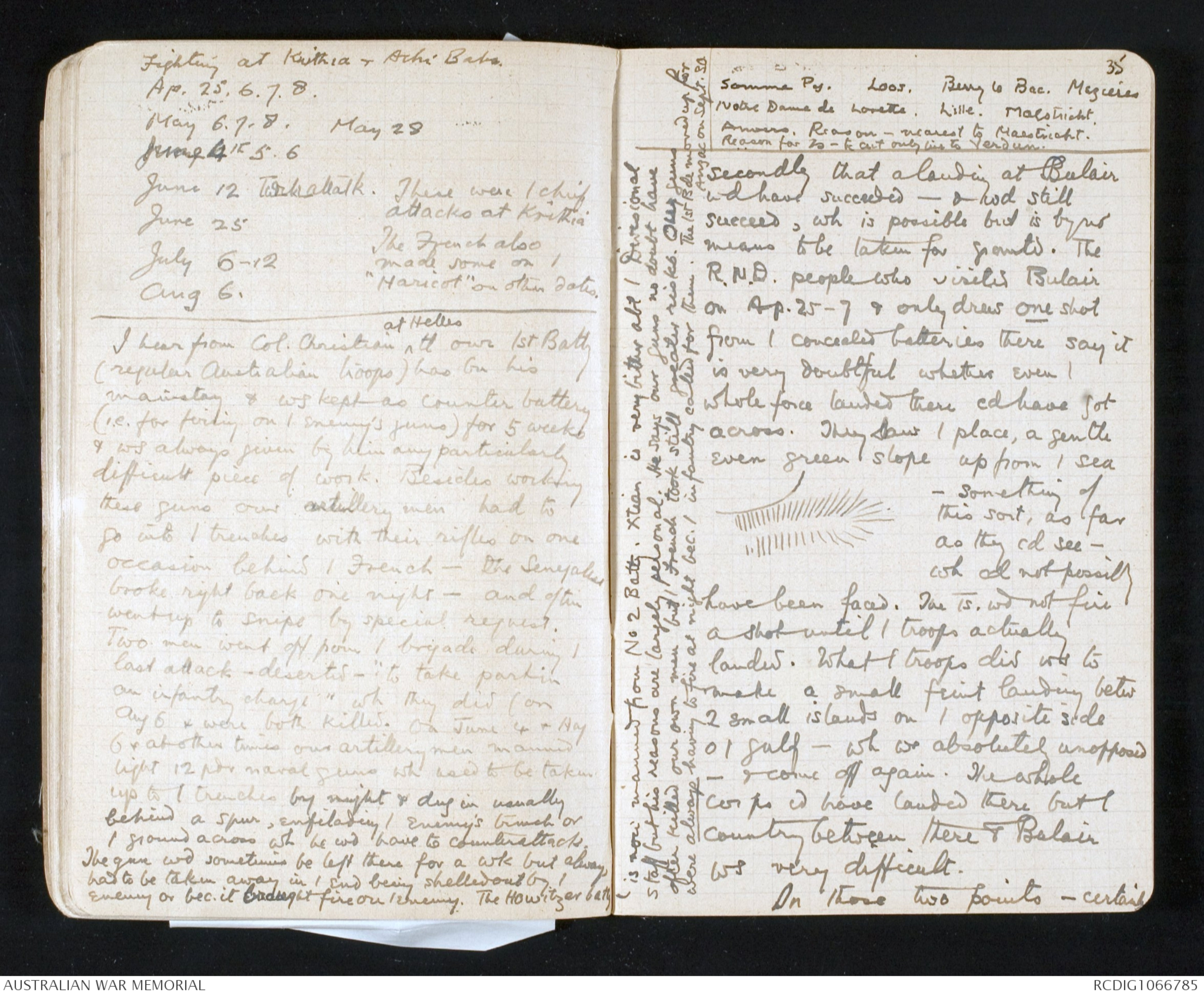
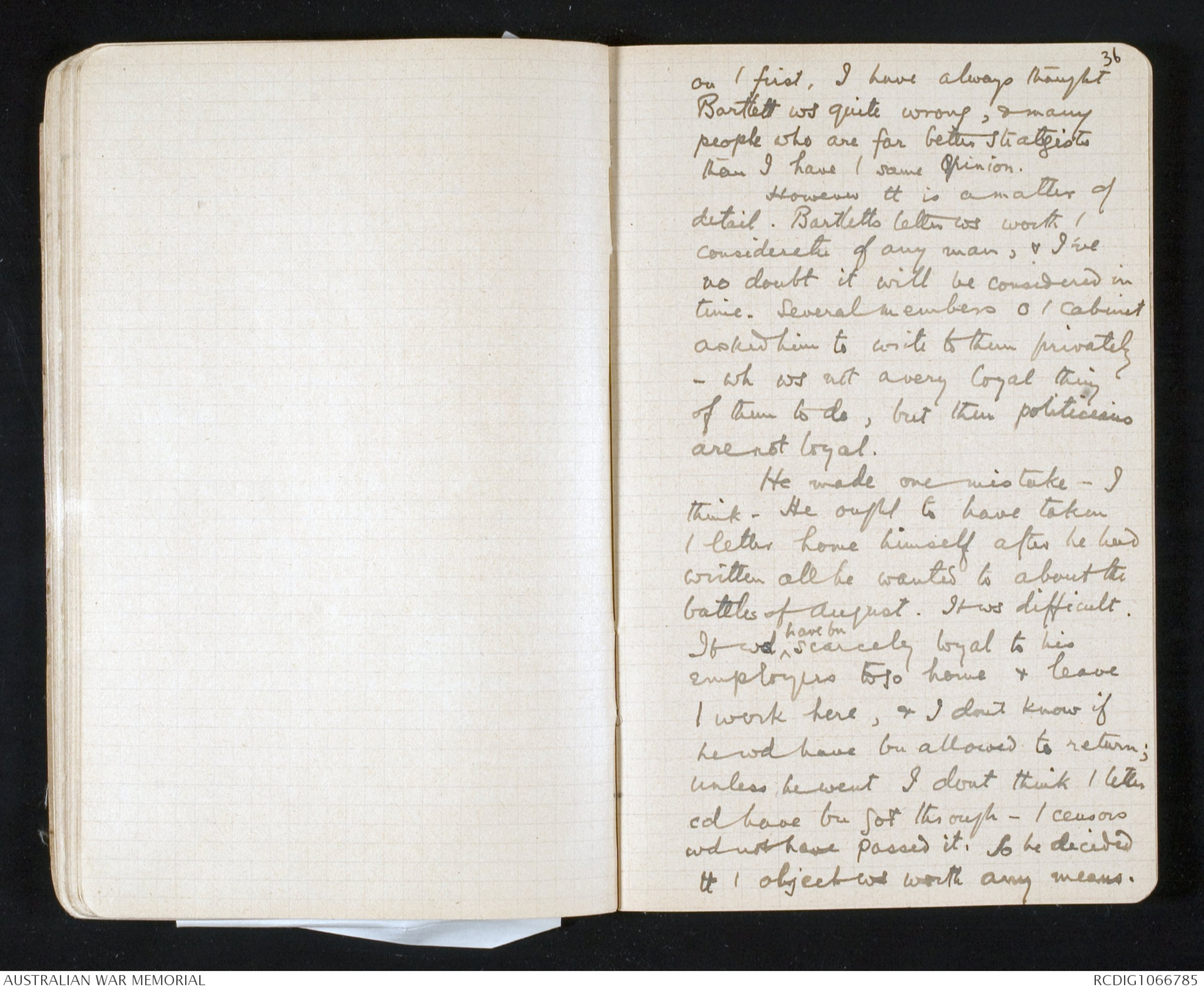
27
even if by painting it that way
I could rouse the blood & make
/ pulse beat faster -& undoubtedly
these men here deserve tt peoples
pulses shall beat for them. But
War Correspts have so habitually
exaggerated / heroism of battles
tt people dont realise tt / real
actions are heroic. If you say
“The line went forward & not one
man came back" that is really
a thing tt can very seldom be
sd of any but / most magnificent
troops - but people say: "No of
course they didn't - they were
British soldiers & British soldiers
dont run away." As a matter of
fact everyone who has seen a battle
knows tt soldiers do very often
run away; th soldiers even
Australian soldiers, have sometimes
to be threatened w a revolver to
28
make them go on - in individual
cases. I have seen it happen
once to an Australian N.C.O.
whom Col. M'Cay threatened to
shoot - & I know MacNaughton
of the 4th Bn on Ap 26, &
Howell Price of the 3rd Bn on Aug
8 & others have done / same
& it has done what they wanted
it to do. If the men The Turks
have to be threatened w machine
guns from behind - I have seen
it in their divisional orders.
There is / case of two o / finest
fighters in / world, / Australian
(possibly / very best in / world) &
/ Turks (certainly one o / best).
Then there is / nonsense abt
wounded soldiers wanting to
get back from hospital to /
front. I have asked / nurses,
I have asked / men, I have
heard them discussing it - &
29
everyone says - what everyone
here knows - that it is not one
soldier in fifty tt wants to go
back to / front. They dread it.
Not very many will actually
shoot their fingers off to escape
from / front but even this is not
uncommon even among Australians
& it is probably less common
w them than ^w most. There are men
who want to get back to / front,
great stalwart true Australians
- but there are not many like them
in any army.
There is plenty of heroism
in war - it teems w it. But
it has bn so overwritten tt
if you write tt a man did
his job people say: Oh, but
there's nothing heroic in that!
Isn't there. You come here & see
/ job & understand it & get out
of your head / nonsense tt
30
is written about it. There is horror
& beastliness & cowardice & treachery
over all of which the writer anxious
to please / public has to throw
his cloak - but / man who does
his job is a hero. And the
actual truth is that though not
all Australians, by any means,
do their job there is a bigger
proportion of them men in / Australian
Army tt try to do it cheerfully xxx & without the least show of
fear than in any force or army
that I have seen ^in Gallipoli. The man who
knows war knows tt this is
magnificent praise. The public
can never know it.
The war correspondent is responsible
for most o / ideas of battle wh / public
possesses. For example - / public thinks
in black & white & nothing between - / public
thinks a retreat or a rout is a matter of
simple cowardice; whereas if ever there
ws a case of mixed motives / ordinary
retreat is one. A hundred men go
31
forward of whom, in / best of
cases, perhaps twenty per cent
wish they were not going forward at
all when they start - & 80 per cent
before they get there. The remaining 20
per They cent are going to do / job
or die simply because they are /
sort of men to whom life is not
worth living on those terms.
After As / enemys trench is
reached, & some o / 20 per cent are
killed, the enemys machine guns
(say) or a more find them out, or perhaps
they merely find realise tt not a quarter
of their members are there; or it
may be they take / trench or /
ground & hang onto it & /
enemy's shrapnel finds them out.
A moment comes when / weaker
men are ready to turn at all
costs - there are wounded
men running back all / time.The One man starts to run back -
perhaps 2 or 3 on either side
start to run with him. The others
coming up see them running back
32
- and have not / remotest idea
why they are running back. Perhaps
(it enters their heads) they are running
away. Perhaps the trench has bn
found impossible to take. Perhaps
they've bn ordered to retire. One
man coming up, or hanging on,
shouts to / man who is getting
up to run: "What's up, Bill?"
Bill may answer: "This is too bloody
'ot for me" - or he may and
often does answer "Word passed
along to retire!" The order to retire
is sometimes no doubt attributed
to an officer who has bn killed
"Captain Smith give the orders
to retire." It goes along / line -
"word passed to retire at once"
Every weak spirited man - & there
is always a sprinkling of them -
taking it up w especial vehemence.
It needs a lot of grit in a
man to say (especially if his
officer has bn killed) "Retire be
33
damned! Who says we're to retire?
Pass along & ask who gave / order."
And yet strong men do that. They
know the "order to retire" is
sometimes an invention & they
are not going to be cheated out of
doing their job by any weak
spirited being in / force. The
success of an army like ours
chiefly depends on what proportion
of these strong independent minded
men there is in it. And in / Australian
force / proportion is unquestionably
undoubtedly high - may amount
to 50 per cent or more. I have
seen them going up against a rain
of fire & / weaker ones retiring
thro' them at / ^very same time - the two
streams going in opposite directions
& not taking / faintest notice of one
another.
Well, this is / true side of war
- but I wonder if anyone wd
believe me outside / army.That be I've never written higher praise
of Australians than is on this page,
but / probability is tt if I were to
put it into print tomorrow / tender
(after opp. page)
The Captain o / Cornwall (wh has come to
relieve Bacchante) was there; & it will
he & his 1st Lieut. gave us an a/c o /
battle o / Falkland Is. wh I relate
further on.
Wed Sept 29. Tonight two officers
came back from G.H.Q. with Bartlett. I was
writing in the Mess tent when they told me Bartlett
was going home. "Lucky beggar," I sd - & presently
some mention came up of his return.
"Well, as a matter of fact he's not returning,"
they sd. "He's got the sack!"
Bartlett ws in Nevinson's tent
when I went in & told me to stay. It
was true. About a month ago he got
Murdoch the Australian "Sun" Correspt,
who ws going to London, to take home with
him a letter to the Prime Minister
putting the state of things here in a
somewhat crude light. It was a
brilliantly written letter - rather overstating
/ case as Bartlett always does, but
a great deal of it ws absolutely
unanswerable & badly needs understanding.
It made two assumptions (1) that the
Suvla-Sari Bair plan could never have
succeeded & cd have accomplished nothing
if it had succeeded - which I think is
false: it ws very difficult but contained
a distinct chance of solid success &
as far as Sari Bair is concerned was
within an ace of success at certain stages;
34
Australian public, which only tolerates
flattery & that in its cheapest form, wouldwill me howl me out of existence.
One has some satisfaction in stickingtold them to the truth in spite of / prejudice
against it - / satisfaction of of fightsxxxxxxxxxx putting up a sort of
fight. But I have a suspicion tt I've
spoilt my chances for ever of being
some day tolerably well off.
News of a big move in France.
Monday Sept 27. Stayed in camp
& wrote all day. I wonder how tt
big French move will affect our
fortunes. May frighten Bulgaria -
but probably / Greeks are scrapping
w them already. The Greek is so
vain of some supposed prowess tt
/ people wd plunge into war w
Bulgaria w a very light heart. Their
General staff doesn't possess / same
illusions, fortunately.
French sd to have broken German
front on a line of 50 kilometres,
ourselves over 5 miles (& gone in
4000 yards); & / Russians are
holding them. Bazley still at Anzac
Tues. Sept 28. To Anzac by /
torpedo boat. (see opp page)
Fighting at Krithia & Achi Baba
Ap 25. 6. 7. 8.
May 6. 7. 8. May 28
June 4th 5. 6
June 12 Turk attack
June 25
July 6-12
Aug 6.
These were / chief
attacks at Krithia.
The French also
made some on /
"Haricot" on other dates
-----
I hear from Col. Christian ^at Helles tt our 1st Batty
(regular Australian troops) has bn his
mainstay & ws kept as counter battery
(i.e. for firing on / enemy's guns) for 5 weeks
& ws always given by him any particularly
difficult piece of work. Besides working
these guns our artillery men had to
go into / trenches with their rifles on one
occasion behind / French - the Senegalese
broke right back one night - and often
went up to snipe by special request.
Two men went off from / brigade during /
last attack - deserted - "to take part in
an infantry charge" wh they did (on
Aug 6 & were both killed. On June 4 & Aug
6 & at other times our artillery men manned
light 12 pdr naval guns wh used to be taken
up to / trenches by night & dug in usually
behind a spur, enfilading / enemy's trench or
/ ground across wh he wd have to counterattack.
The gun wd sometimes be left there for a wk but always
had to be taken away in / end being shelled out by /
enemy or bec. it brought fire on / enemy. The Howitzer batty
35
[*is now manned from No 2 Batty. Xtian is very bitter abt / Divisional
staff but his reasons are largely personal. He says our guns no doubt have
often killed our own men but / French took still greater risks. Our guns
were always having to fire at night bec. / infantry called for them. The 1st Bde moved up for
Anzac on Sept. 30*]
Somme Py. Loos. Berry le Bac. Mezieres
Notre Dame de Lorette. Lille. Maestricht.
Anvers. Reason - nearest to Maestricht.
Reason for [shorthand] - to cut only line to Verdun.
secondly that a landing at Bulair
wd have succeeded - & wd still
succeed, wh is possible but is by no
means to be taken for granted. The
R.N.D. people who visited Bulair
on Ap. 25-7 & only drew one shot
from / concealed batteries there say it
is very doubtful whether even /
whole force landed there cd have got
across. They saw / place, a gentle
even green slope up from / sea
[Diagram- see original document]
- something of
this sort, as far
as they cd see -
wh cd not possibly
have been faced. The Ts. wd not fire
a shot until / troops actually
landed. What / troops did ws to
make a small feint landing betw
2 small islands on / opposite side
o / gulf - wh ws absolutely unopposed
- & come off again. The whole
corps cd have landed there but /
country between there & Bulair
ws very difficult.
On those two points - certainly
36
on / first, I have always thought
Barlett ws quite wrong, & many
people who are far better strategists
than I have / same opinion.
However tt is a matter of
detail. Bartletts letter ws worth /
consideratn of any man, & I've
no doubt it will be considered in
time. Several members o / Cabinet
asked him to write to them privately
- wh ws not a very loyal thing
of them to do, but then politicians
are not loyal.
He made one mistake - I
think. He ought to have taken
/ letter home himself after he had
written all he wanted to about the
battles of August. It ws difficult.
It wd ^have bn scarcely loyal to his
employers to go home & leave
/ work here, & I don't know if
he wd have bn allowed to return;
unless he went I dont think / letter
cd have bn got through - / censors
wd not have passed it. So he decided
that / object ws worth any means.
 Sam scott
Sam scottThis transcription item is now locked to you for editing. To release the lock either Save your changes or Cancel.
This lock will be automatically released after 60 minutes of inactivity.